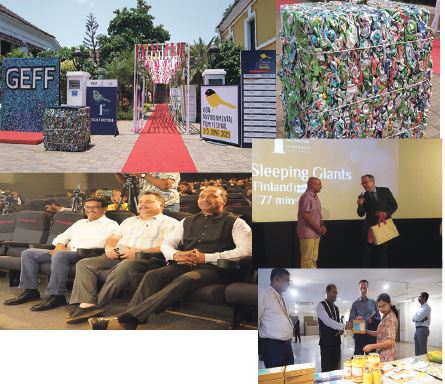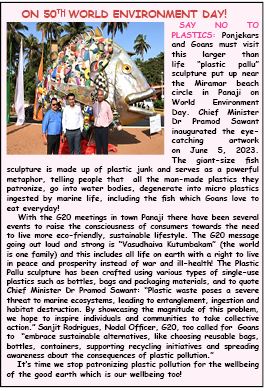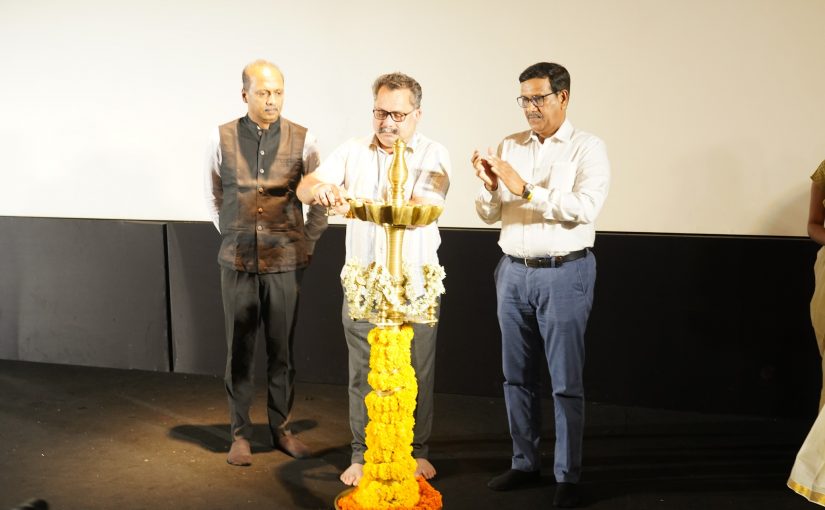AT THE GOA ENVIRONMENTAL FILM FESTIVAL, June 3 to 5…50 award-winning films were screened on the state of the environment in India and the world. At the inauguration Minister for Power Nilesh Cabral, G20 Nodal Officer Sanjit Rodrigues and chairperson of Goa State Pollution Control Board Mahesh Patil lit the ceremonial lamp for a less polluted world!
By Pankajbala R Patel
IT was a summer treat and shocker for mind and body, heart and soul. It should be for all of us who do care and wonder what to do about the deteriorating environment around us! There is no ignoring the content matter of the first ever Goa Environmental Film Festival at the Maquinez Palace, ESG complex, in capital city Panaji from June 3 to 5, 2023. The festival was part of the G20 meetings going on but at least I didn’t see a single politician or bureaucrat making time to catch any of the estimated 50 films from India and the G20 countries to catch some of the films screened over three days at the two ESG auditoriums.
But then again and…(sigh)…even I could barely catch a handful of the films, much though I would have liked to have seen all of them and hope the GEFF cache of films will return with the International Film Festival of India later in the year as a vital section – films devoted to the rapidly changing face of our world and its impact on the good earth which is finite and not infinite as most of us imagine.
There were films detailing how the air we breathe, the water we drink, the food we eat for fighting fit health, matters. This is the stark unvarnished truth and until we see and do something about it we will never be free, nor healthy individually or collectively. It is not good enough that we superficially play at recycling our mod con lifestyles contributing to manmade garbage – even if the result is a myriad things empty beverage cans furniture or bottle caps wall frames, roads of compressed plastic bags, etcetera! Some garbage recycling models were up at the venue of this most welcome of film festivals (see example pictures elsewhere here).

RURAL TO URBAN
THE world of human beings has moved in the last hundred years from harder rural agricultural lifestyles to undoubtedly easier, self-indulgent urban industrial lifestyles—where the comforts of the good life as we all seek them rolled out from home to cars to offices to wherever else around the globe. Nobody wants to go back to when there was no light at the touch of a switch, water at the turn of a tap or homes big or small to sleep in cool comfort with family…but surely we can draw the lines between how comfortable we want to be at the expense of destroying Mother Earth’s womb and bosom which keeps us all alive in primary ways?
See the larger picture! Perhaps it is already too late but we need to ask these questions now: How much science, technology, radiation in the air, how much social media take-overs to the detriment of quality of life of children and society in general – above all, how much non-biodegradable man-made garbage can we dump and pile up endlessly above or below the ground here, there and everywhere. Without suffering the consequences living irresponsibly, unaccountably?
Who is paying the price? One great line doing the environment circuit is “Soon there will be more plastics in the oceans than fish!” Don’t laugh. Sanjit Rodrigues (secretary protocol and nodal officer of G20 events in Goa) in his brief presentation at the GEFF inauguration said it: We love to see films about wild places and wildlife but the environment is also a touchy subject, and yes, if we do not take it seriously there will be more plastics in our seas and oceans than fish. Remember we have only one earth, he reminded. If human beings don’t take care of their earth, who will?
Coming to the films I saw there were a few cheering up films, but several films from India and abroad testify to how the earth is turning into a monumental man-made garbage dump in real time. It’s a vile narrative of ugly air, water and food. You want to eat micro plastics entering the food chain of life — which keeps our immune system in top condition to deal with health emergencies? Or as a civilisation are we going to chase mammon alone like we may eat money when the time comes, go to bed with it, make love to it, and keep on recycling life endlessly as we spawn future gen-next dependent on armies of robots? More man-made non-biodegradable garbage recycled or not!
These are films telling us what a mockery human beings are making of our primary home we love to call “Mother Earth.” Which we worship with perfect hypocritical irony and pious pride in our religious and cultural traditions; don’t we sing worshipful Sanskrit prayers to sun, moon, stars, earth, ocean, trees, air, water, that we live on. So why can’t we connect the dots and decide on whether means justify ends or ends justify means! See the nightmares coming up one after another? The earth’s climate is changing and this will hit human beings at the apex of the chain of survival – from fittest to sickest.

INTO THE DARK
A FILM like the 28-minute documentary “Into the Dark” by Michael Snyder tells us how the penetration of light, in the Arctic region of the earth, which for centuries has existed as nothing but thick icy plates…is now giving way to the growth of plankton with light filtering into melting icy waters. This will impact life on earth geographically and geologically, trigger climate migration slowly or suddenly! What if the tropical countries become too hot to sustain life and only the Arctic and Antarctica zones of the earth become liveable? Who will move there to stay alive and who will die in possible tragedies we still dismiss lightly today?
Can we imagine it? Many of the films were acquired courtesy the kindness of various foreign embassy staff of countries like for example, Finland. The ambassador of Finland was present for the screening of a film from Finland, Marco Rohr’s “Tale of Sleeping Giants” (77 minutes) which showcases how magically life comes alive and returns to sleep in the some of the oldest tundra lands of Finland – life is so harsh here for all forms of life human and non-human, but at the same time we see exquisite cameos of insight into untouched wild lands, how big and small flora and fauna survive to grow, bloom, reproduce, move on. This is a mindboggling timeless film capturing life beyond the paradise and hell of the seasons which come and go.
Later in a brief aside I asked the ambassador if Finland is seeing any tragic consequences of global warming and climate change, he replied, not yet! So far they are fine, safe from global warming. Life is never easy in the cold countries like Finland which depend so much on efficient energy systems – but yes, he realizes that if life becomes too harsh in the equatorial countries it will trigger off climate migrations with people moving desperately to “happier” countries like the Scandinavian countries!
“Happier” will be to do with both quality and quantity and financial resources available. Films from Bulgaria, Canada, Croatia, Ireland, Ireland, Portugal, Russia and Spain were screened; perhaps the films from abroad, from countries where people have become more fierce about garbage impacting them and have initiated dynamic cleaning-up movements, are more cutting edged, less frivolous on the subject of the earth’s environment and ecological systems being spoilt by the careless lifestyles of human beings.
From India the inaugural film screened — the Oscar-winning debut film “The Elephant Whisperers” (2022) by Kartiki Gonsalves – is as delightfully haunting as keenly educative. In Mudumalai wildlife sanctuary down south Tamil Nadu there is an elephant “hospital” set aside for orphan elephants and elephants in trouble for healing and caretaking; here elephants are treated and allowed to heal in the company of their humble human healers who share a special relationship with their “patients.” When the elephants small and big are healed the wildlife rangers take them away for re-releasing in their old habitat. We get an idea of how friendly, loving and intelligent the “giants” can be if given a chance!
Miguel Cortes Costa and Ricardo Guerreiro’s 40 minute film “Malacata – The Tale of the Lonely Mountain Range” (Portugal) comes alive with superb anthropology stories and conservation efforts; the film deals with a forgotten no man’s isolated wild land between Portugal and Spain, with a 600 million years history — here you may come face to face with the Iberian lynx, the most endangered feline cat in the world. There’re several films on the elusive snow leopard, but A Ganshena’s “To See A Snow Leopard” (Russia, 78 minutes) has stunning, enthralling footage of camera traps catching the lives of snow leopards roaming the Altai mountains of southern Siberia (Russia’s remote border with Mongolia, China and Kazakhstan). Where snow leopards roam clearly there may be no barbed wire borders and it makes sense when the tough rangers pull the fences down. Seeing a snow leopard in real life or on camera is akin to having seen God!
How the last of our wildlife is struggling to survive at the mercy of our monstrous civilisation makes for some poignant viewing. A film to cheer is Tovino Paiva’s “Un Mar de Lixo” (Portugal, 36 minutes). Translating to “A Sea of Trash” it’s inspirational film narrating blow-by-blow how the biggest beach clean-up happened over 18 days by a group of nine volunteers at first (went up to a hundred civilian volunteers later), calling themselves the Sea’s Brigade. In May 2019 these sea brigade collected 20 tons of garbage from the sea beaches and the effort continued till all the beaches were restored as pristine originals. The beach clean-up campaign took place along a 45 km beach belt between Troia and Melides in Grandola county in Portugal. It changed an entire people’s mind set, no more littering of public places for love or for money!
A film to warm the cockles of the heart is a film to do with a centenarian father’s love for his land – in Kabir Naik’s “Bhuiput” (India, 10 minutes). It’s a Goan film profiling the love of a “man of the earth” who is Kabir’s father — “Eknath aajo” – namely Eknath Kauthankar who urges his children and grandchildren not to be ashamed of being farmers. There will always be dignity, sustainability and food if they farm the land. Then equally memorable are Shukla’s “Mulostan”(India, 27 mins) and Jalaludin Baba’s “Global Warming” (India, 31 mins) about a Kashmir where springtime’s unseasonal snowfall takes a toll of delicate almond, peach, cherry, apple trees. Climate change plus crass development is leading to horrific floods too, making people’s life miserable.
Closing film Carla Simons’ “Alcarras”(Spain, 2 hours) is an unusual family drama of peach and fig harvests, in which the patriarch tells the story of how the family had offered sanctuary during war time to a wealthy neighbouring family – the family returned the favour by letting them farm their orchard lands. But no legal papers were signed! So when an unsentimental gen next takes over and want to sell their parental land there is trouble in paradise! “Alcarras” offers much food for thought at various levels, on the subject of a family which lives, works, eats, plays together (even if “children are more difficult to rear than pigs”). Finer thinking prevails over anxieties of financial stability as the family contemplates being uprooted from farmland they loved and treasured as their own. This, must see film.
This is to say everyone must see the GEFF films from children of age to students to adults including our politicians and business community upper crust and lower crust; the first of course have no problems seeing any number of films at home. Here’s hoping GEFF returns as a segment of the International Film Festival of India 2023 — so that I may see the films I didn’t see this time around! In the meantime try to do “maka naka plastics” at home as well as out of the home!
